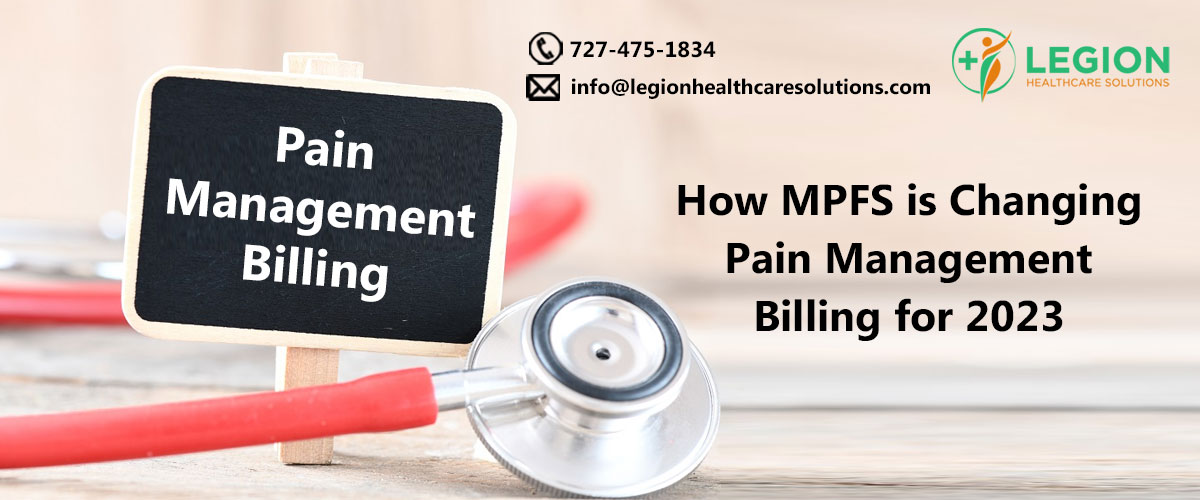
How MPFS is Changing Pain Management Billing for 2023
CY 2023 Medicare Physician Fee Schedule (MPFS)
On Nov. 1, 2022, the Centers for Medicare and Medicaid Services (CMS) released the final 2023 Medicare Physician Fee Schedule (MPFS), addressing Medicare payment and quality provisions in the coming year. Let’s understand how MPFS is changing pain management billing for 2023. Through CMS, federal government making efforts to effectively address pain management as a response to the nation’s overdose crisis,such as the National Pain Strategy and the HHS Pain Management Best Practices Inter-Agency Task Force (PMTF) Report.
Several sections of the SUPPORT Act describe actions the Department of Health and Human Services has been directed to take to improve pain care, such as section 2003, which amended Medicare’s Annual Wellness Visit to include a review of factors for evaluation related to pain for patients using opioid medications. Under the section 6032 Report and the Action Plan, CMS is recommending to explore the possibility of establishing a new bundled payment under the Medicare Physician Fee Schedule for integrated multimodal pain care. This includes elements such as diagnosis, a person-centered plan of care, care coordination, medication management, and other aspects of pain care.
Chronic Pain Management and Treatment Services
In CY 2023 Medicare Physician Fee Schedule (MPFS), CMS finalized new HCPCS codes, G3002 and G3003, and valuation for chronic pain management and treatment services (CPM). CMS believe the chronic pain management and treatment services HCPCS codes will improve payment accuracy for these services. It will also prompt more practitioners to welcome Medicare beneficiaries with chronic pain into their practices, and encourage practitioners already treating Medicare beneficiaries who have chronic pain to spend the time to help them manage their condition within a trusting, supportive, and ongoing care partnership.
The finalized codes include a bundle of services furnished during a month that will act as the starting point for holistic chronic pain care, aligned with similar bundled services in Medicare, such as those furnished to people with suspected dementia or substance use disorders. CMS have finalized the CPM codes to include the following elements in the code descriptor:
- diagnosis;
- assessment and monitoring;
- administration of a validated pain rating scale or tool;
- the development, implementation, revision, and/or maintenance of a person-centered care plan that includes strengths, goals, clinical needs and desired outcomes; overall treatment management;
- facilitation and coordination of any necessary behavioral health treatment;
- medication management;
- pain and health literacy counseling;
- any necessary chronic pain related crisis care; and ongoing communication and coordination between relevant practitioners furnishing care, such as physical and occupational therapy, complementary and integrative care approaches, and community-based care, as appropriate.
Opioid Treatment Programs (OTPs)
In order to stabilize the price for methadone for calendar year 2023 and following years, CMS is finalizing the proposal to revise methodology for pricing the drug component of the methadone weekly bundle and the add-on code for take-home supplies of methadone. As proposed, CMS will base the payment amount for the drug component of HCPCS codes G2067 and G2078 for calendar year 2023 and following years on the payment amount for methadone in 2021 and update this amount annually to account for inflation using the PPI for Pharmaceuticals for Human Use (Prescription).
Additionally, based on the severity of needs of the patient population diagnosed with opioid use disorder (OUD) and receiving services in the OTP setting, CMS is finalizing the proposal to modify the payment rate for the non-drug component of the bundled payments for episodes of care to base the rate for individual therapy on a crosswalk to a code describing a 45-minute session, rather than the current crosswalk to a code describing a 30-minute session. This will increase overall payments for medication-assisted treatment and other treatments for OUD, recognizing the longer therapy sessions that are usually required.
CMS is also finalizing the proposal to allow the OTP intake add-on code to be furnished via two-way audio-video communications technology when billed for the initiation of treatment with buprenorphine, to the extent that the use of audio-video telecommunications technology to initiate treatment with buprenorphine is authorized by the Drug Enforcement Administration (DEA) and Substance Abuse and Mental Health Services Administration (SAMHSA) at the time the service is furnished. CMS is also finalizing the proposal to permit the use of audio-only communication technology to initiate treatment with buprenorphine in cases where audio-video technology is not available to the beneficiary, and all other applicable requirements are met.
Additionally, CMS is allowing periodic assessments to be furnished audio-only when video is not available for the duration of CY 2023, to the extent that it is authorized by SAMSHA and DEA at the time the service is furnished. CMS is clarifying that OTPs can bill Medicare for medically reasonable and necessary services furnished via mobile units in accordance with SAMHSA and DEA guidance. CMS is finalizing the proposal that locality adjustments for services furnished via mobile units would be applied as if the service were furnished at the physical location of the OTP registered with DEA and certified by SAMHSA.
Chronic Pain Management and Behavioral Health Services
As described in Goal 3 of CMS’s 2022 Behavioral Health Strategy (Strategy), CMS intends to improve the care experience for individuals with acute and chronic pain, expand access to evidence-based treatments for acute and chronic pain, and increase coordination between primary and specialty care through payment episodes, incentives, and payment models.
Rural Health Clinics (RHCs) and Federally Qualified Health Centers (FQHCs)
CMS is finalizing the addition of chronic pain management and behavioral health integration services to the RHC and FQHC specific general care management HCPCS code, G0511, which aligns with changes made under the PFS for CY 2023. Since the requirements for the chronic pain management and behavioral health integration services are similar to the requirements for the general care management services furnished by RHCs and FQHCs (which are the current services for which RHCs and FQHCs can use HCPCS code G0511) the payment rate for HCPCS code G0511 will continue to be the average of the national non-facility PFS payment rates for the RHC and FQHC care management and general behavioral health codes (CPT codes 99484, 99487, 99490, and 99491) and PCM codes (CPT codes 99424 and 99425) Payment will be updated annually based on the PFS amounts for these codes, which is how these updates are made currently.
We referred CMS announcement on ‘Calendar Year (CY) 2023 Medicare Physician Fee Schedule Final Rule’ to discuss how MPFS is changing pain management billing for 2023. Legion Healthcare Solutions is a leading medical billing company providing complete billing and coding services. We can help you in receiving timely and accurate reimbursements for pain management services. Legion Healthcare Solutions is having extensive experience working with eClincialWorks (ECW), Lytech, Medisoft, AdvancedMD, Kareo, Office Ally, and all major medical billing software. To know more pain management billing services, contact us at 727-475-1834 or email us at info@legionhealthcaresolutions.com
Get A Quote
[forminator_form id=”4528″]
